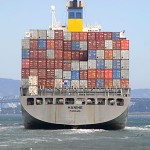Great Recession or Great Retooling?
 History may look on the Great Recession as the period when the US halted government's growth and moved to an export-led production cycle.
History may look on the Great Recession as the period when the US halted government's growth and moved to an export-led production cycle.
The Wall Street Journal reports on China's oil shock: cooking oil.
These days, Liu Chuansheng nervously scouts five locations before he buys cooking oil, illustrating how a sudden spike in the price of the Chinese kitchen's most vital ingredient has become close to a national crisis.
On a recent Friday, the balding 33-year-old, who runs a breakfast stand with his wife, wheeled a shopping cart into the aisle of a C.P. Lotus Corp. superstore in northern Shanghai, eying only prices. In seconds, his wife emptied the shelves of its 11 remaining bottles of Cofco Ltd. "Five Lakes" soybean oil, the discount choice at 47.90 yuan, or about $7.20, for five liters.
Cooking oil prices have jumped 27% in China in the past year. That's the stuff that makes revolutions. It's the latest indicator of the pressures that must sooner or later lead China to upvalue its currency. Revaluation of the renminbi will enhance Chinese purchasing power on world markets while raising the export prices of Chinese products. Expect to see more Chinese tourism, more Chinese investment in the rest of the world - and more Chinese imports, including from the US.
That's one change that will be left behind by the Great Recession. Here's another, as indicated by a story in the New York Times.
Across the nation, a rising irritation with public employee unions is palpable, as a wounded economy has blown gaping holes in state, city and town budgets, and revealed that some public pension funds dangle perilously close to bankruptcy. In California, New York, Michigan and New Jersey, states where public unions wield much power and the culture historically tends to be pro-labor, even longtime liberal political leaders have demanded concessions — wage freezes, benefit cuts and tougher work rules.
Already, state and local governments have shrunk their workforces by a total of over 200,000 persons since 2008. More pay cuts, pension changes, and job attrition seems likely to follow. The federal workforce has been growing since 2000, adding about 140,000 civilian workers, after shrinking by almost 400,000 between 1990 and 2000. (We're looking at you, TSA and Homeland Security.) The post-2008 state and local cuts have more than compensated for that federal growth. If federal employment now goes into reverse, we could be looking at a permanently leaner public sector as another enduring consequence of the Great Recession. Maybe history will look back on this period and instead call it the Great Retooling: when the USA ended the generation-long expansion of state and local government and shifted from a housing-led consumption cycle to an export-led production cycle.